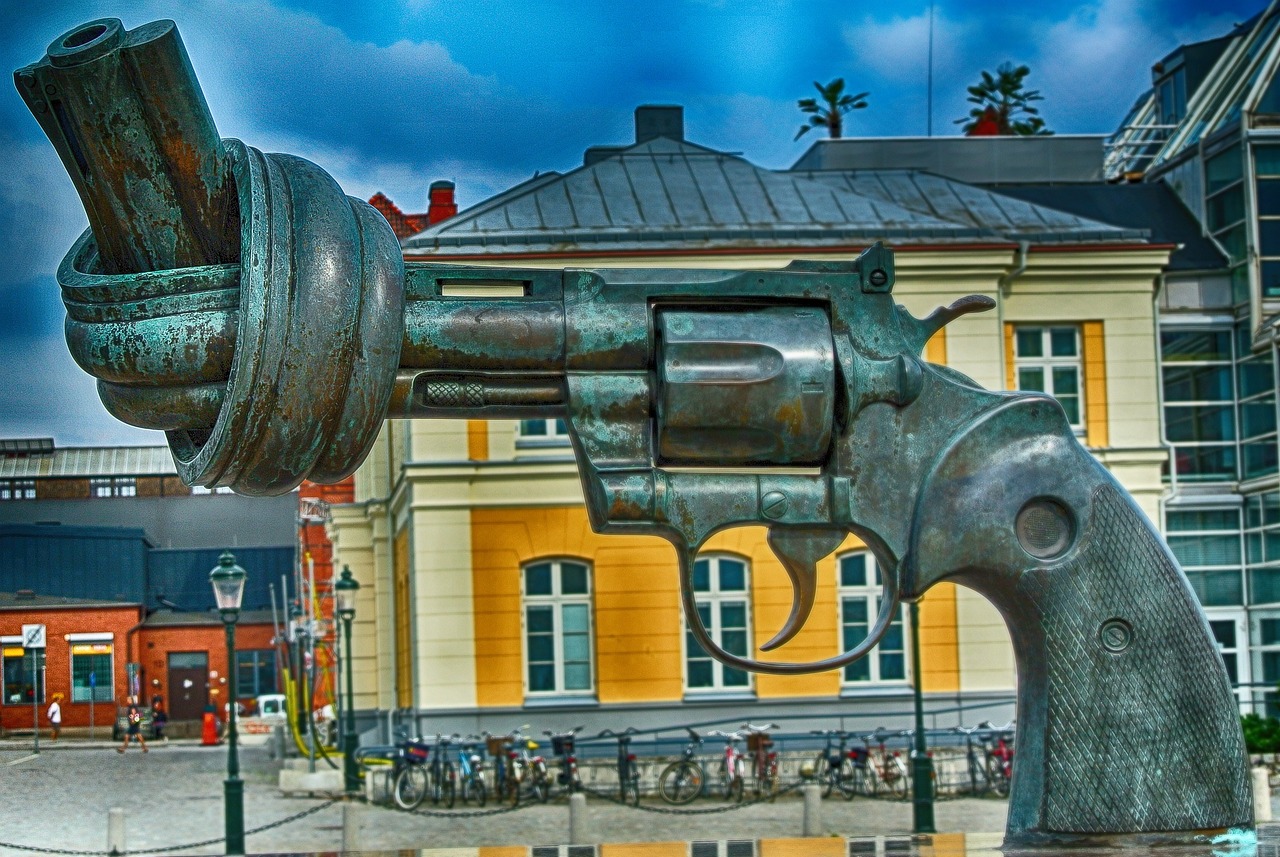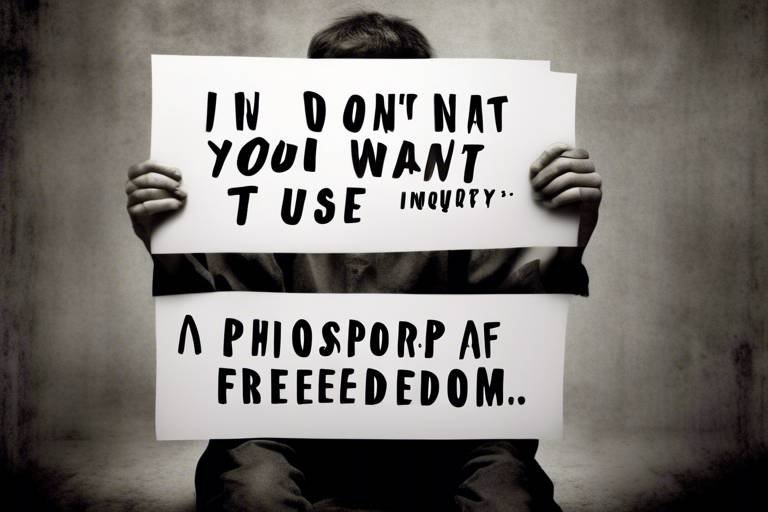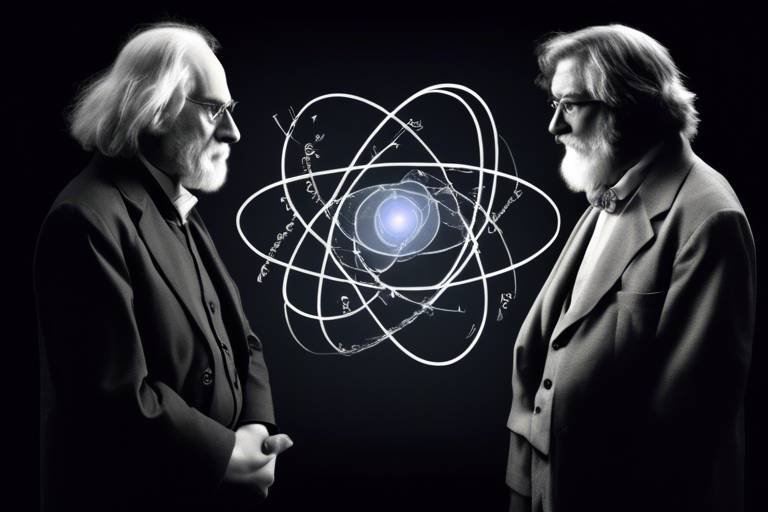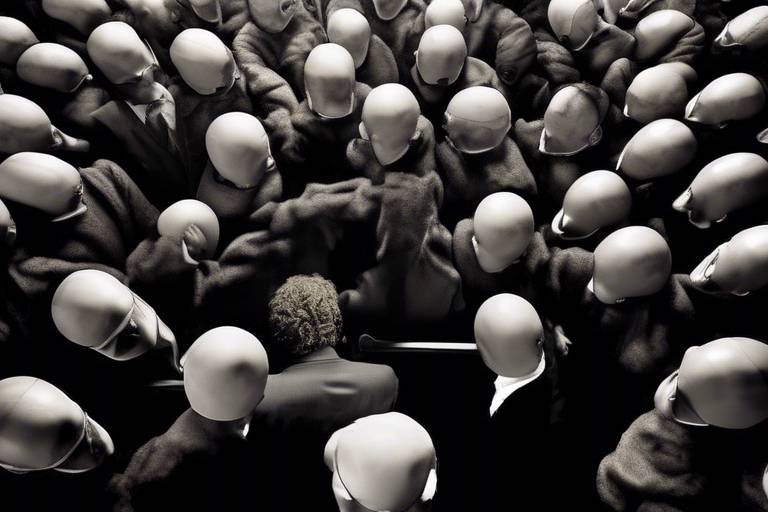Is Human Violence a Philosophical Concern?
Human violence has long been a topic of intense scrutiny and debate within philosophical circles. But why does it matter? Why should we, as a society, care about the philosophical implications of violence? The reality is that violence is not just a physical act; it’s a profound phenomenon that intertwines with our ethical beliefs, social structures, and even our understanding of human nature. By examining violence through a philosophical lens, we can uncover deeper meanings and implications that might otherwise remain hidden beneath the surface.
At its core, the exploration of human violence leads us to ponder fundamental questions about morality, justice, and the human condition. Is violence an inherent part of being human, or is it a byproduct of societal influences? Are we, as beings capable of reason and empathy, doomed to repeat cycles of violence, or can we find pathways to peace? These questions are not merely academic; they resonate with our lived experiences and the world we navigate daily.
Philosophy offers us tools to dissect these questions, providing frameworks for understanding the motivations behind violent acts and the societal structures that perpetuate them. For example, the distinction between physical violence—like assault or war—and psychological violence, which can manifest as bullying or manipulation, is crucial in shaping our discourse. Furthermore, systemic violence, embedded within institutions and societal norms, often goes unnoticed but has devastating effects on marginalized communities.
As we delve deeper into this subject, we’ll explore how historical perspectives on violence have evolved, shedding light on the contributions of key philosophers who have shaped our understanding. From Hobbes’ grim view of humanity’s violent tendencies to Rousseau’s idealization of the noble savage, the philosophical discourse surrounding violence is rich and complex. Understanding these perspectives not only informs our current debates but also helps us navigate the ethical dilemmas that arise in contemporary society.
Ultimately, grappling with the philosophical implications of violence is not just an academic exercise; it’s a necessary endeavor for anyone seeking to understand the world better. By engaging with these ideas, we can foster more profound discussions about justice, morality, and the potential for a more peaceful society. So, as we embark on this exploration, let’s keep an open mind and consider how philosophy can illuminate the shadows cast by human violence.
- What is the philosophical definition of violence?
Philosophically, violence can be understood as any act that causes harm or suffering to others, whether physically, psychologically, or systemically. It raises questions about morality, ethics, and human nature.
- How have historical philosophers influenced our understanding of violence?
Philosophers like Hobbes and Rousseau have profoundly influenced how we perceive violence. Hobbes viewed it as a natural state of humanity, while Rousseau argued that civilization corrupts our innate goodness.
- What are the ethical implications of violence in society?
The ethical implications are vast, covering just war theory, self-defense, and the moral dilemmas surrounding violent actions. These discussions help us navigate real-world issues regarding justice and morality.

Understanding the Nature of Violence
When we talk about violence, it’s essential to first grasp what we mean by the term. Violence is not a monolithic concept; rather, it manifests in various forms, each with its own implications and consequences. Broadly speaking, we can categorize violence into three primary types: physical, psychological, and systemic. Each type has its roots in different societal issues and triggers, shaping how we perceive and address violence in philosophical discussions.
Physical violence is perhaps the most visible form, encompassing acts that cause bodily harm or injury to individuals. This includes everything from domestic abuse to armed conflict. The immediate impact of physical violence is often clear and devastating, leaving scars that can last a lifetime. But what about psychological violence? This form can be just as damaging, involving emotional abuse, manipulation, and coercion. The scars here may not be visible, but they can be profound, affecting mental health and personal relationships. Lastly, we have systemic violence, which refers to the structural inequalities embedded within society that perpetuate harm against certain groups. This could include systemic racism, economic disparity, and institutional oppression, where the violence is not always overt but is ingrained in the very fabric of society.
Understanding these categories helps us navigate the complex philosophical discourse surrounding violence. For instance, while physical violence might evoke immediate outrage and calls for justice, psychological and systemic forms often require deeper analysis and reflection. This distinction is crucial because it influences how we approach solutions to violence. If we only focus on physical manifestations, we might overlook the underlying psychological and systemic issues that fuel violent behavior in the first place.
Moreover, the implications of these forms of violence extend beyond individual acts. They shape societal norms and influence the ethical frameworks we use to evaluate violence. For example, consider how cultural narratives around masculinity often glorify physical strength and aggression. This societal conditioning can lead to an acceptance of physical violence as a means of resolving conflict, perpetuating a cycle of harm. In contrast, recognizing psychological and systemic violence invites us to reconsider our values and the structures that uphold them.
In summary, understanding the nature of violence requires a multifaceted approach that considers its various forms and the contexts in which they arise. By distinguishing between physical, psychological, and systemic violence, we can better engage with the philosophical questions surrounding this pervasive issue. This understanding not only enriches our discussions but also points us toward more comprehensive solutions that address the root causes of violence rather than merely its symptoms.

The Historical Context of Violence
The exploration of violence through a historical lens offers profound insights into the philosophical discourse surrounding this complex phenomenon. Throughout history, violence has been a constant companion of humanity, shaping societies and influencing moral frameworks. Understanding how philosophical thoughts on violence have evolved is crucial in grasping its implications in contemporary life. As we traverse through time, we can see how different eras have interpreted violence, often reflecting the social, political, and cultural climates of their times.
In ancient civilizations, violence was often viewed through the lens of survival and power dynamics. Early philosophers like Socrates and Plato pondered the nature of justice and the role of the individual within society. They laid the groundwork for understanding violence not just as a physical act but as a moral failing or a sign of societal dysfunction. For instance, Plato's allegories often depicted the struggle between the ideal state and the chaos of human instincts, suggesting that violence arises when societal structures fail to uphold justice.
Fast forward to the Enlightenment, where thinkers like Thomas Hobbes and Jean-Jacques Rousseau presented starkly different views on human nature and violence. Hobbes, in his seminal work Leviathan, argued that violence is inherent in the human condition, a natural state that necessitates the formation of social contracts to maintain order. In contrast, Rousseau posited that humans were inherently good and that it was the corrupting influence of civilization that fostered violence. This divergence in thought illustrates the philosophical struggle to reconcile the innate tendencies of humanity with the structures of society.
As we delve deeper into the 19th and 20th centuries, the discussion of violence took on new dimensions with the advent of modern philosophy. Thinkers like Friedrich Nietzsche challenged the moral underpinnings of society, arguing that traditional values often suppressed the human will to power, which could manifest as violence. Nietzsche’s exploration of the “will to power” invites us to consider how societal norms can both inhibit and incite violent behavior, making it a crucial point of discussion in understanding modern violence.
Moreover, the historical context of violence is not just limited to individual philosophers but also encompasses the broader societal changes that influenced their thoughts. Wars, revolutions, and social upheavals have been pivotal in shaping philosophical discourse. For example, the World Wars of the 20th century prompted existentialist thinkers like Sartre and Camus to grapple with the absurdity of violence and its implications for human existence. Their reflections on the human condition in the face of such brutality challenged previous notions of morality and ethics, leading to a more nuanced understanding of violence.
In summarizing the historical context of violence, we can identify key philosophical shifts that have occurred over time:
| Era | Key Philosophers | Philosophical Perspectives on Violence |
|---|---|---|
| Ancient | Socrates, Plato | Violence as a moral failing; need for justice |
| Enlightenment | Hobbes, Rousseau | Innate violence vs. societal corruption |
| 19th Century | Nietzsche | Will to power; societal norms and violence |
| 20th Century | Sartre, Camus | Absurdity of violence; existential reflections |
This historical perspective on violence not only enriches our understanding of philosophical discourse but also highlights the need for an ongoing conversation about the implications of violence in our modern society. As we continue to grapple with issues of war, crime, and systemic violence, the insights of these philosophers provide a valuable framework for addressing the ethical dilemmas we face today.
- What is the main philosophical debate surrounding violence? The main debate often centers on whether violence is an inherent part of human nature or a result of societal influences.
- How have historical events influenced philosophical thoughts on violence? Major historical events, such as wars and revolutions, have prompted philosophers to reevaluate the moral implications of violence and its impact on society.
- Who are some key philosophers that have contributed to the understanding of violence? Notable philosophers include Hobbes, Rousseau, Nietzsche, Sartre, and Camus, each offering different perspectives on the nature and morality of violence.

Philosophers on Violence
When we dive into the murky waters of human violence, we find ourselves surrounded by a myriad of philosophical thoughts that have shaped our understanding over centuries. Philosophers have grappled with the question of why violence exists and what it means for humanity. Their insights are not just academic; they resonate in our everyday lives, influencing how we perceive conflicts and confrontations. Let's take a closer look at some of the most influential thinkers who have tackled the topic of violence.
First up is Thomas Hobbes, a 17th-century philosopher who painted a rather grim picture of human nature. In his seminal work, "Leviathan," Hobbes argues that in the absence of societal structures, humans are in a constant state of war, driven by their innate desires and fears. He famously described life in the state of nature as "solitary, poor, nasty, brutish, and short." For Hobbes, violence is an inherent part of human existence, something we must control through a social contract—a collective agreement to form a society that curbs our violent instincts. This perspective suggests that without the constraints of society, our darker impulses would reign supreme.
On the flip side, we have Jean-Jacques Rousseau, who offers a contrasting viewpoint. Rousseau's idea of the "noble savage" posits that humans are born inherently good and that it is civilization itself that corrupts this natural state. According to Rousseau, societal constructs and the pursuit of material wealth lead to competition, jealousy, and ultimately, violence. He believed that in a more primitive state, humans lived in harmony, and it was the complexities of modern life that sowed the seeds of discord. This raises an intriguing question: if violence is a product of societal corruption, can we find ways to return to a more peaceful existence?
Then we have the existentialist philosopher Friedrich Nietzsche, who viewed violence through a different lens. Nietzsche believed that violence is not merely a destructive force but can also be a catalyst for creativity and growth. He famously stated, "What does not kill me makes me stronger." For Nietzsche, the struggle inherent in violence can lead to a kind of personal evolution, pushing individuals to transcend their limitations. This perspective invites us to consider how violence can be both a destructive and a transformative experience, depending on the context and the individual involved.
These philosophical perspectives illustrate the complexity of violence in human society. Each thinker offers a unique lens through which to view the phenomenon, highlighting the interplay between human nature, societal influence, and individual experience. As we continue to explore the implications of violence, it's essential to recognize that these philosophical insights are not merely theoretical; they have real-world applications in our understanding of conflict, justice, and morality.
In summary, the discourse on violence is rich and varied, shaped by the thoughts of influential philosophers like Hobbes, Rousseau, and Nietzsche. Their ideas challenge us to reflect on our own beliefs and the societal structures we inhabit. As we navigate through the philosophical landscape of violence, we are reminded that understanding its roots may be the first step toward finding resolutions and fostering a more peaceful society.
- What is the main argument of Hobbes regarding violence?
Hobbes argues that violence is a natural part of human existence in the absence of societal structures, leading to a social contract to control these instincts. - How does Rousseau's view of violence differ from Hobbes'?
Rousseau believes that humans are inherently good and that civilization corrupts this nature, leading to violence, unlike Hobbes who sees violence as innate. - What role does Nietzsche attribute to violence?
Nietzsche views violence as a potential catalyst for personal growth and creativity, suggesting it can be a transformative experience.

Hobbes and the State of Nature
When we dive into the philosophical ocean of Thomas Hobbes' thoughts on violence, we find ourselves navigating through the turbulent waters of the "state of nature." Hobbes, a 17th-century philosopher, painted a rather grim picture of humanity's natural condition. He believed that without the constraints of society, human beings would revert to a chaotic existence where life was "solitary, poor, nasty, brutish, and short." Imagine a world where every person is a potential threat to every other person; this is the essence of Hobbes' argument.
In Hobbes' view, the state of nature is characterized by a constant state of war, where individuals act primarily out of self-interest and survival. This leads to a vicious cycle of violence, as people compete for limited resources. To illustrate this concept, consider a scenario where two individuals are stranded on a deserted island. Without rules or social contracts, their instincts might drive them to violence over food or shelter. This example encapsulates Hobbes' belief that violence is an inherent part of human nature, waiting to surface when societal structures are absent.
Hobbes argues that in order to escape this brutal reality, individuals must come together to form a social contract. This agreement entails surrendering certain freedoms to a sovereign authority—essentially a powerful ruler or government—in exchange for security and order. The social contract is not merely a theoretical construct; it serves as a foundational idea for modern political philosophy. It positions the sovereign as a necessary force to curb violent instincts and maintain peace, thereby transforming the chaotic state of nature into a more civilized society.
However, this raises important questions: Is it justifiable to give up personal freedoms for the sake of security? What happens when the very authority meant to protect us becomes oppressive? Hobbes' theory prompts us to reflect on the delicate balance between freedom and security, a debate that remains relevant today.
In summary, Hobbes' perspective on violence and the state of nature emphasizes that without a governing body, human beings are prone to violence driven by self-preservation. His ideas challenge us to consider the implications of our societal structures and the extent to which they shape our behavior. Through the lens of Hobbes, we can better understand the philosophical underpinnings of violence and the necessity of governance in mitigating its effects.
- What is the state of nature according to Hobbes? Hobbes describes the state of nature as a condition where there are no laws or government, leading to a war of all against all.
- Why does Hobbes believe violence is inherent in human nature? He argues that without societal constraints, individuals act solely out of self-interest, which can lead to violent conflicts over resources.
- What is the social contract? The social contract is an agreement where individuals give up some freedoms to a governing authority in exchange for protection and order.
- How does Hobbes’ view of violence influence modern political thought? Hobbes' ideas lay the groundwork for discussions about the role of government, authority, and individual rights in maintaining social order.

Rousseau's Noble Savage
When we dive into the philosophical waters of Jean-Jacques Rousseau, we encounter the compelling concept of the 'noble savage'. This idea is not just a catchy phrase; it encapsulates Rousseau's profound belief that humans are inherently good but are corrupted by the very civilization that they have created. Imagine a pristine forest where humanity thrives in harmony with nature, untainted by the complexities of modern society. This is Rousseau's vision, a stark contrast to the chaotic world we live in today.
Rousseau argued that in their natural state, individuals possess an innate goodness, characterized by compassion and a sense of community. However, as societies evolved and became more structured, this inherent goodness began to erode. The introduction of private property, social hierarchies, and organized government led to competition, jealousy, and ultimately, violence. To illustrate this, Rousseau famously stated, “Man is born free, and everywhere he is in chains.” These chains symbolize the societal constructs that bind us and often lead to conflict.
In Rousseau's view, the noble savage represents an idealized human, one who lives in a state of nature, free from societal corruption. This notion raises several intriguing questions: What does it mean to be truly free? Is our civilization a necessary evil, or does it merely serve to amplify our baser instincts? Rousseau believed that the more we distance ourselves from our natural state, the more we become susceptible to the destructive forces of violence.
Interestingly, Rousseau's thoughts on the noble savage have sparked extensive debate among modern philosophers and social theorists. Many have examined the implications of his ideas in the context of contemporary society. For instance, some argue that the noble savage is a romanticized notion that oversimplifies the complexities of human nature and social interaction. Others see it as a call to return to a more harmonious relationship with nature and each other, advocating for a lifestyle that prioritizes community and compassion over competition and individualism.
To further understand Rousseau's impact, let's look at how his concept of the noble savage compares to other philosophical thoughts on violence and humanity:
| Philosopher | View on Human Nature | Impact on Violence |
|---|---|---|
| Rousseau | Inherently good; corrupted by society | Violence stems from societal constructs |
| Hobbes | Inherently selfish; life in nature is "solitary, poor, nasty, brutish, and short" | Violence is a natural state; requires a social contract to mitigate |
| Nietzsche | Will to power; violence as a fundamental aspect of existence | Embraces violence as a means of self-assertion |
Rousseau's perspective invites us to reflect on our own lives and the societal structures we inhabit. Are we, as a society, fostering environments that promote violence, or are we cultivating spaces that encourage understanding and compassion? The noble savage serves as a reminder that while we have made significant advancements, we must not lose sight of our fundamental humanity. In a world rife with conflict, Rousseau's insights remain incredibly relevant, urging us to reconsider our values and the impact of civilization on our nature.
- What is the concept of the 'noble savage'?
It refers to the idea that humans are inherently good but become corrupted by society. - How does Rousseau's view differ from Hobbes'?
While Rousseau believes humans are good by nature, Hobbes views them as selfish and violent without societal constraints. - Can we apply Rousseau's ideas to modern society?
Yes, many contemporary discussions about community, environmentalism, and social justice draw from Rousseau's insights.

Modern Philosophical Perspectives
In today’s world, the discourse surrounding violence has taken on new dimensions, influenced by various contemporary philosophical movements. The complexities of violence are no longer merely viewed through the lens of historical perspectives; instead, they are examined through modern frameworks that challenge traditional ideas. Feminist theory, for instance, has introduced a critical examination of how societal structures perpetuate violence, particularly against marginalized groups. This perspective argues that violence is not just an individual act but a systemic issue, deeply embedded in the fabric of societal norms and power dynamics.
Furthermore, critical theory expands on this by emphasizing the role of ideology in shaping perceptions of violence. It posits that dominant cultural narratives often justify violent actions, framing them as necessary or even noble. For example, the glorification of military actions in media can desensitize individuals to the real implications of violence, making them more susceptible to accepting it as a solution to conflict. This raises an important question: How do we reconcile the glorification of violence in media with the ethical implications of such portrayals?
Moreover, the rise of intersectionality in modern philosophy has led to a more nuanced understanding of violence. Intersectional analysis examines how various forms of oppression—such as racism, sexism, and classism—intersect and contribute to unique experiences of violence. This perspective is crucial in recognizing that violence is not a uniform experience; it varies significantly based on identity and context. For instance, the violence faced by a woman of color may differ greatly from that experienced by a white male, highlighting the need for a more inclusive dialogue about violence.
Additionally, contemporary philosophers are increasingly addressing the psychological aspects of violence. The examination of trauma and its impact on behavior has become a focal point in understanding why individuals may resort to violence. The work of psychologists and philosophers alike emphasizes that violence can often be a response to deep-rooted psychological pain or societal alienation. This perspective compels us to ask: Can understanding the psychological roots of violence lead to more effective resolutions, rather than merely punitive measures?
As we explore these modern philosophical perspectives, it becomes clear that the conversation around violence is evolving. It is no longer sufficient to view violence simply as an act of aggression; we must consider the broader implications of power, identity, and systemic structures that contribute to violent behaviors. This shift in thinking challenges us to rethink our responses to violence and consider more holistic approaches that address its root causes.
- What is the role of feminist theory in understanding violence? Feminist theory critiques how societal structures contribute to violence, especially against women and marginalized groups, emphasizing the need for systemic change.
- How does intersectionality change our understanding of violence? Intersectionality highlights that experiences of violence are not uniform and vary based on multiple identities, such as race, gender, and class.
- Can psychological insights help prevent violence? Yes, understanding the psychological roots of violence can lead to more effective interventions that address underlying trauma rather than just punishing violent behavior.
- What is the impact of media on perceptions of violence? Media can glorify violence, desensitizing audiences and shaping cultural narratives that justify violent actions, which raises ethical concerns.

The Ethics of Violence
When we dive into the murky waters of violence, we can't help but bump into the ethical dilemmas that surround it. It's a bit like trying to navigate through a dense fog; the more we explore, the more questions arise. Is it ever justifiable to resort to violence? What moral framework do we use to assess violent actions? These questions are not just academic; they resonate deeply in our everyday lives. The ethics of violence is a complex web woven with threads of morality, legality, and human emotion, which makes it a hot topic in philosophical discourse.
One of the key areas we need to explore is the concept of just war theory. This theory attempts to provide a moral basis for engaging in war and violence, establishing criteria that must be met for violence to be deemed acceptable. It’s like having a rulebook for a game where the stakes are incredibly high. The principles of just war theory can generally be categorized into two main sections: jus ad bellum (the right to go to war) and jus in bello (the right conduct within war). These principles help us determine when it is morally permissible to engage in violence and how to conduct oneself in a violent situation.
For instance, jus ad bellum includes criteria such as:
- Just Cause: There must be a valid reason for going to war, such as self-defense against aggression.
- Legitimate Authority: Only duly constituted authorities can declare a war.
- Right Intention: The intention behind the war must be good, aiming for peace and justice.
- Probability of Success: There should be a reasonable chance of success to justify the violence.
- Proportionality: The anticipated benefits of waging war must outweigh the expected harm.
On the flip side, we have jus in bello, which governs how combatants should behave during warfare. This includes principles like proportionality and discrimination, ensuring that violence is directed only at legitimate military targets and not at civilians. It's a delicate balance, much like walking a tightrope; one misstep can lead to catastrophic consequences.
Another important aspect of the ethics of violence is the concept of self-defense. This raises the question: when is it morally acceptable to use violence to protect oneself or others? In many legal systems, self-defense is recognized as a valid justification for violent actions, but the ethical implications can be murky. For example, if someone is attacked, they may feel justified in responding with violence. However, the extent of that response is often debated. Should one use only the minimum force necessary? Or does the context allow for a more aggressive response? These are the kinds of dilemmas that philosophers grapple with.
Furthermore, the ethics of violence also intersects with issues of power dynamics and societal structures. Feminist and critical theory perspectives challenge traditional notions of violence, suggesting that it often reflects underlying power imbalances. Violence is not just an act; it can be a manifestation of systemic oppression, where marginalized groups may resort to violence as a means of reclaiming agency. Understanding violence through this lens adds another layer of complexity to the ethical considerations. It’s like peeling an onion; each layer reveals more about the societal conditions that foster violent behaviors.
Ultimately, the ethics of violence is a rich field of inquiry that invites us to reflect on our values and beliefs. It forces us to confront uncomfortable truths about human nature and society. As we ponder these questions, we must remember that our understanding of violence is not merely theoretical; it has real-world implications that affect individuals and communities alike. So, the next time you hear about an act of violence, consider the ethical dimensions at play. What does it reveal about our society? What can we learn from it?
- What is just war theory? Just war theory is a philosophical framework that outlines the moral criteria for engaging in warfare and conducting oneself during war.
- When is self-defense considered ethical? Self-defense is generally considered ethical when the response is proportional to the threat faced and is necessary to protect oneself or others.
- How do power dynamics influence violence? Power dynamics can shape the context in which violence occurs, often reflecting systemic inequalities and oppression in society.

Just War Theory
When we dive into the murky waters of violence and morality, one of the most compelling frameworks we encounter is . This philosophical approach attempts to delineate when it is morally permissible to engage in war and the ethical conduct expected during such conflicts. Think of it as a moral compass, guiding nations and individuals alike through the turbulent seas of warfare. But what exactly does this theory entail? Let’s break it down.
Just War Theory is typically divided into two main components: jus ad bellum (the right to go to war) and jus in bello (the right conduct within war). Each of these components has its own set of criteria that must be satisfied for a war to be considered just. For instance, before engaging in warfare, a nation must have a just cause, such as self-defense against aggression or protecting innocent lives. In other words, it’s not enough to simply declare war; there must be a legitimate reason that justifies the violence.
Moreover, the theory emphasizes that a war must be declared by a legitimate authority. This means that not just anyone can take up arms; it has to be sanctioned by those in power who are responsible for the welfare of their citizens. This leads us to ponder—can a group of citizens rise up in rebellion if they feel their government is unjust? This question complicates the discussion, as it touches on the balance of power and the moral legitimacy of authority.
Once a war is underway, jus in bello comes into play. This aspect focuses on the conduct of soldiers and the ethical treatment of combatants and non-combatants alike. It asserts that even in the chaos of war, certain principles must be adhered to, such as proportionality and discrimination. Proportionality refers to the idea that the violence used in warfare must be proportional to the injury suffered, while discrimination emphasizes the need to distinguish between combatants and innocent civilians. This raises a crucial question: in the heat of battle, how can one ensure that these principles are upheld?
| Criteria | Jus ad Bellum | Jus in Bello |
|---|---|---|
| Just Cause | Must have a legitimate reason for war | N/A |
| Legitimate Authority | Declared by those in power | N/A |
| Proportionality | N/A | Use of force must be proportional to the threat |
| Discrimination | N/A | Distinguish between combatants and civilians |
In conclusion, Just War Theory serves as a vital framework for understanding the ethical dimensions of warfare. It challenges us to think critically about our motivations for engaging in violence and the responsibilities that come with it. As we navigate the complexities of modern conflicts, the principles of Just War Theory remain more relevant than ever, urging us to reflect on the moral implications of our actions in the face of violence.
- What is Just War Theory? Just War Theory is a philosophical framework that outlines the conditions under which war can be morally justified and the ethical conduct expected during warfare.
- What are the main components of Just War Theory? The two main components are jus ad bellum (the right to go to war) and jus in bello (the right conduct within war).
- Can a war ever be considered just? Yes, a war can be considered just if it meets the criteria set out by Just War Theory, such as having a legitimate cause and being declared by a rightful authority.
- How does Just War Theory apply to modern warfare? The principles of Just War Theory continue to guide ethical discussions about military intervention and the treatment of civilians in contemporary conflicts.

Self-Defense and Moral Justification
When we talk about self-defense, we often find ourselves navigating a complex web of moral and ethical considerations. Imagine you're walking home late at night, and suddenly, someone approaches you aggressively. Your heart races, and your instinct is to protect yourself. But here lies the dilemma: at what point does self-defense become justified? This question isn't just a matter of instinct; it dives deep into the philosophical waters of morality and ethics.
The concept of self-defense is rooted in the idea that individuals have the right to protect themselves from harm. However, the moral justification of violent actions taken in self-defense can vary significantly depending on the context. For instance, if someone is threatened with immediate physical harm, the use of force might seem justifiable. Yet, if that force escalates beyond what is necessary to neutralize the threat, we enter murky waters where the ethics of the situation come into play.
Philosophers have long debated the thresholds for moral justification in self-defense scenarios. One common framework is the principle of proportionality. This principle suggests that the level of force used in self-defense must be proportionate to the threat faced. If someone pushes you, responding with lethal force is not only excessive but also morally questionable. Here’s a simple breakdown:
| Type of Threat | Appropriate Response |
|---|---|
| Verbal Aggression | De-escalation or retreat |
| Physical Assault | Defensive maneuver or restraint |
| Life-Threatening Attack | Use of necessary force |
Another important aspect to consider is the intent behind the action. If a person acts out of fear and a genuine belief that their life is in danger, their actions may be viewed differently than if they acted out of anger or vengeance. This distinction highlights the importance of understanding not just the actions taken, but the motivations behind them. The ethical landscape becomes even more complicated when we factor in the social context. For example, individuals from marginalized communities may feel that their need for self-defense is heightened due to systemic inequalities, leading to different interpretations of what constitutes justified violence.
Ultimately, the question of self-defense and moral justification isn’t black and white. It requires a nuanced understanding of the circumstances, intentions, and consequences involved. As we navigate these philosophical discussions, we must also consider the implications of our beliefs on societal norms and laws surrounding violence. Should the laws reflect a more forgiving stance on self-defense, or do they risk encouraging a culture of violence? These are critical questions that challenge us to think deeply about the nature of violence and our responses to it.
In conclusion, self-defense is a multifaceted issue that intertwines ethics, morality, and personal safety. As we explore these themes, it's essential to remain open-minded and consider various perspectives, ensuring that our understanding evolves alongside the complexities of human behavior and societal norms.
- What constitutes self-defense? Self-defense is the act of protecting oneself from imminent harm or danger, using reasonable force to prevent injury.
- Is self-defense legally justified in all situations? No, self-defense must meet certain legal criteria, including proportionality and immediacy of the threat.
- How does the concept of intent affect self-defense claims? Intent plays a crucial role; actions taken out of fear for one's life are often viewed more favorably than those taken out of anger.
- Can self-defense be used as a defense in court? Yes, if proven that the individual acted within the bounds of self-defense, it can be a valid legal defense.
Frequently Asked Questions
- What is the philosophical definition of violence?
Philosophically, violence is often defined as the intentional use of physical force or power, whether threatened or actual, against oneself, another person, or a group. It can manifest in various forms, including physical, psychological, and systemic violence, each raising unique ethical questions and implications.
- How do historical perspectives shape our understanding of violence?
Historical perspectives are crucial in understanding violence as they provide context on how philosophical thoughts have evolved over time. Key philosophers, such as Hobbes and Rousseau, have contributed significantly to our comprehension of violence, influencing contemporary debates on its ethical and social implications.
- What is Hobbes' view on violence in society?
Hobbes viewed violence as an inherent aspect of the state of nature, where life without societal structure is "solitary, poor, nasty, brutish, and short." He argued that the social contract is essential to curb these violent instincts and maintain order within society.
- How does Rousseau's concept of the 'noble savage' relate to violence?
Rousseau's 'noble savage' suggests that humans are inherently good but become corrupt through civilization, which breeds violence. He believed that societal structures often lead to moral decay and aggressive behaviors, challenging the notion that violence is an innate human trait.
- What are the modern philosophical debates surrounding violence?
Modern debates often include feminist and critical theory perspectives that question traditional views on power dynamics and aggression. These discussions explore how societal structures contribute to violence and advocate for a deeper understanding of its ethical implications.
- What is Just War Theory?
Just War Theory is a philosophical framework that outlines the conditions under which engaging in war is morally permissible. It includes criteria such as just cause, proportionality, and the intention behind the conflict, aiming to ensure that violence is a last resort.
- When is self-defense considered morally justified?
Self-defense is often deemed morally justified when there is an imminent threat to oneself or others. The ethical considerations surrounding self-defense involve assessing the proportionality of the response and whether non-violent alternatives were available.



















